 ★★★
★★★
“The most expensive straight-to-video release ever.”
Okay, that’s perhaps a little unfair. When this began filming, back in August 2018, who could have predicted that the summer this year would be all but wiped out [seriously: the second quarter in North America, the total box-office was $4.8 million. Last year, the same period brought in $3.3 billion] As films scrambled to re-establish themselves, finding new slots for hopeful release, post-pandemic, there were inevitable casualties, as some were left without seats when the music stopped. Probably the biggest loser was the latest of Disney’s live-action adaptations, based on the beloved animated feature of 1998.
Despite a budget estimated at $200 million, it had the misfortune to be originally scheduled just before everything went to hell. Indeed, it even had its world premiere on March 9th, but the broader release was bumped, first to July, then August, before it was cancelled as a theatrical release in the United States, instead being used as a pay-per-view title on Disney’s streaming service, Disney+. Matters were likely not helped by online comments made by the film’s star against the anti-Chinese protests in Hong Kong, which triggered calls for a boycott of the film. It was notable, even before the film was commercially available, that the Google ratings of the film were largely 1/5 or 5/5, as competing armies of review bombers sought to skew the results to their desired outcome.
As with most things which provoke extreme reactions, the reality sits somewhere in the middle. This isn’t the first live-action adaptation of the legend I’ve seen. There was previously a 2009 adaptation from Hong Kong, starring Wei Zhao as Hua Mulan. Our review of it concluded, “There’s a nice balance between the action and emotional aspects… Heavy is the head that wears the general’s helmet is the moral here, and it’s driven home effectively enough, thanks mostly to Zhao’s solid performance.” It merited 3½ stars, a little above this, though that may simply be due to the newest version being more directly compared to the animated version. That’s inevitable, especially when Disney have sampled songs from it into the new soundtrack.
 And make no mistake: I love the animated version: to me, it’s the best of the “new wave” of Disney features which began with Beauty and the Beast. It has a huge emotional range, perhaps more than any other Disney film outside Pixar, and can switch on a dime, going from cheerful song to grim destruction without jarring. I will also say, this is the first I’ve seen in Disney’s live-action adaptations of their animated catalog. All the others seemed entirely redundant, but this one seemed to offer scope for a different take on the subject. It does deliver on this expectation, but I can’t help feeling that, overall, more was lost here than gained.
And make no mistake: I love the animated version: to me, it’s the best of the “new wave” of Disney features which began with Beauty and the Beast. It has a huge emotional range, perhaps more than any other Disney film outside Pixar, and can switch on a dime, going from cheerful song to grim destruction without jarring. I will also say, this is the first I’ve seen in Disney’s live-action adaptations of their animated catalog. All the others seemed entirely redundant, but this one seemed to offer scope for a different take on the subject. It does deliver on this expectation, but I can’t help feeling that, overall, more was lost here than gained.
The live-action version certainly doesn’t manage the same breadth of emotion. For example, there are moments here which feel like they should be comic – except they’re just not funny. It’s a Very Serious tale [capitals used advisedly], almost to the point of solemn, with this Mulan at times feeling like a duty-driven automaton. It’s a thoroughly different portrayal, considering the story is almost identical. When the Chinese empire is threatened by Mongolians, under Böri Khan (Lee), the Emperor requires each family to provide one man to the army. Rather than succumb to an arranged marriage, Mulan (Liu) takes the place of her father in the draft. Though her ruse is eventually discovered, Mulan proves key to the defeat of the invaders.
This edition, however, has no musical numbers, no comic relief sidekick dragon and no romantic interest for Mulan in the shape of her commander [this was apparently excised for #MeToo reasons, but doing so ended up angering some in the GLBTQ community. Yes, apparently, Mulan/Li Shang gay ‘shipping is a thing. Who knew?] Instead, it adds Xianniang (Li), a sorceress who assists Khan, but who sees in Mulan a younger version of herself – someone forced to repress their abilities and true nature, in compliance with social norms. Their scenes have some potential in terms of dramatic conflict, but there just isn’t enough screen time for their relationship to have much impact.
It’s something the film needs, to overcome what it otherwise a distinct lack of emotion. Crouching Tiger showed a martial arts film can still connect to the viewer’s heart, and this never comes particularly close to doing so. The heroine here largely operates in a vacuum, as far as relationships go, even after her true identity is revealed. This may have been an issue recognized by the makers of the animated version. The presence of Eddie Murphy’s Mushu there now makes a great deal of sense, providing that necessary outlet, and acting as a foil for the heroine throughout her journey.
Yet, boy (or rather, girl), does it look nice. Outside of a couple of moments of slightly flaky CGI early on, such as the young Mulan jumping from a roof, this is a beautiful spectacle, clearly influenced by the likes of Hero in its use of colour. The action is well-choreographed; having Yen as leader of the Imperial army doesn’t exactly hurt, even if you wonder why he can’t defeat the invaders single-handed. After all, I’ve seen Ip Man… [Also in supporting roles, Jet Li plays the Emperor, and the matchmaker is Cheng Pei Pei, of Crouching Tiger, Hidden Dragon fame, but more relevantly here, was one of the first Hong Kong action heroines, in 1966’s Come Drink with Me] I’m definitely sorry we were robbed of the chance to see this on a big screen, as that’s the scale it deserves.
Most of the above was written within 24 hours of watching it, but now, with less than 72 hours having passed, I am seriously struggling to recall many particularly memorable moments. Overall, I can’t say I felt like the two hours were wasted, and it’s perfectly adequate as a big-budget, epic bit of wire-fu. Although, “perfectly adequate” feels like a disappointment, considering what I was hoping for, and this is not going to replace the 1998 film among my favorites, songs or no songs.
Dir: Niki Caro
Star: Yifei Liu, Li Gong, Jason Scott Lee, Donnie Yen





 This is certainly something of a novelty and/or a gimmick. But it’s none the less reasonably effective for it. Templeton – who is a woman, despite her first name, given to her after the character of Christopher Robin in the Winnie The Pooh books – suffered from polio as a young child. This left her with a badly damaged right leg; despite this, she pursued an acting career, and became a regular on soap The Young and the Restless for eight years. While I’ve seen a few disabled action heroes – Daredevil was blind – as far as disabled action heroines go, it’s basically her and Imperator Furiosa from Mad Max. And Charlize Theron wasn’t genuinely short an arm, so advantage Templeten. Though, sadly, she appears to have passed away in 2011.
This is certainly something of a novelty and/or a gimmick. But it’s none the less reasonably effective for it. Templeton – who is a woman, despite her first name, given to her after the character of Christopher Robin in the Winnie The Pooh books – suffered from polio as a young child. This left her with a badly damaged right leg; despite this, she pursued an acting career, and became a regular on soap The Young and the Restless for eight years. While I’ve seen a few disabled action heroes – Daredevil was blind – as far as disabled action heroines go, it’s basically her and Imperator Furiosa from Mad Max. And Charlize Theron wasn’t genuinely short an arm, so advantage Templeten. Though, sadly, she appears to have passed away in 2011. It has been twenty years since
It has been twenty years since  I can’t believe there have been seven X-Men movies now. I think the last I saw was the second, which came out in 2003. Since then, there seems to have been a lot of mutants under the bridge, so to speak – and, it appears, some jiggery-pokery with timelines. That’s the only way to explain the death early on in this origin story, of someone I’m
I can’t believe there have been seven X-Men movies now. I think the last I saw was the second, which came out in 2003. Since then, there seems to have been a lot of mutants under the bridge, so to speak – and, it appears, some jiggery-pokery with timelines. That’s the only way to explain the death early on in this origin story, of someone I’m 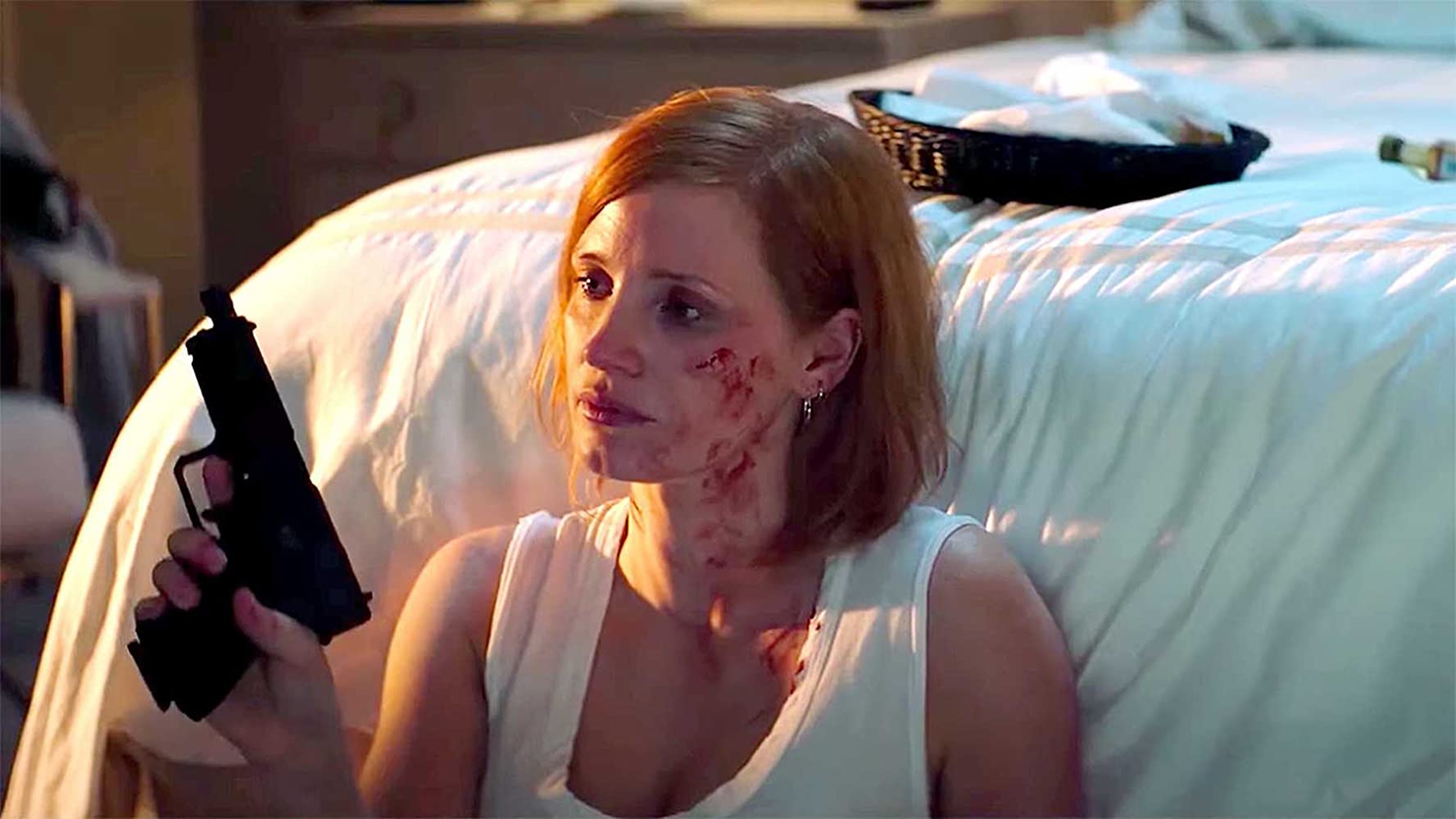 It has been a rough year for action heroines at the cinema. Actually, it has been a rough year for everyone everywhere, thanks to COVID-19. But for the purposes of this site, we have been sadly lacking the kind of tentpole releases which we usually write about over the summer. Wonder Woman 1984, for example, was to have come out in June. But with all venues bar the few remaining drive-ins closed, that was moved first to August, then October [and I don’t know about you, but I’m still not comfortable with the concept of cinema going]. Disney’s live-action version of Mulan opted to bypass theatres all together, and will instead be released on their streaming service.
It has been a rough year for action heroines at the cinema. Actually, it has been a rough year for everyone everywhere, thanks to COVID-19. But for the purposes of this site, we have been sadly lacking the kind of tentpole releases which we usually write about over the summer. Wonder Woman 1984, for example, was to have come out in June. But with all venues bar the few remaining drive-ins closed, that was moved first to August, then October [and I don’t know about you, but I’m still not comfortable with the concept of cinema going]. Disney’s live-action version of Mulan opted to bypass theatres all together, and will instead be released on their streaming service. The above paragraph is lean, mean and would have made for a perfectly decent movie. However, the script apparently decides it’s not enough – perhaps Chastain wanted something into which she could sink her dramatic teeth. For we get a whole slew of subplots and conflicts thrown on top. These include, but are not limited, to the following. Ava is a recovering alcoholic. Ava is estranged from her sister (Weixler). Ava had a previous relationship with her sister’s boyfriend, and there are still feelings there. He has a gambling problem. Ava caught her father having an affair, which led to her leaving home. It also caused Ava to break ties with her mother, played by Geena Davis.
The above paragraph is lean, mean and would have made for a perfectly decent movie. However, the script apparently decides it’s not enough – perhaps Chastain wanted something into which she could sink her dramatic teeth. For we get a whole slew of subplots and conflicts thrown on top. These include, but are not limited, to the following. Ava is a recovering alcoholic. Ava is estranged from her sister (Weixler). Ava had a previous relationship with her sister’s boyfriend, and there are still feelings there. He has a gambling problem. Ava caught her father having an affair, which led to her leaving home. It also caused Ava to break ties with her mother, played by Geena Davis. There’s probably a decent movie in here. An interesting premise, occupying the nexus where religion and science cross, and some very effective hand-to-hand action sequences, would potentially have made for a decent 90 minutes of fun. The problem is, this actually runs for 10 x forty-minute episodes, and the result is stuffed so full of padding, that it could be used as a sofa. The nuns of the title are members of the Order of the Cruciform Sword, a group which has been fighting demonic entities for centuries. Chief among them is the bearer of the Halo, a divine relic which bestows its owner with great powers, including rapid healing and the ability to phase through solid objects.
There’s probably a decent movie in here. An interesting premise, occupying the nexus where religion and science cross, and some very effective hand-to-hand action sequences, would potentially have made for a decent 90 minutes of fun. The problem is, this actually runs for 10 x forty-minute episodes, and the result is stuffed so full of padding, that it could be used as a sofa. The nuns of the title are members of the Order of the Cruciform Sword, a group which has been fighting demonic entities for centuries. Chief among them is the bearer of the Halo, a divine relic which bestows its owner with great powers, including rapid healing and the ability to phase through solid objects. The life of Jill Conway (Seyfried) is slowly returning to somewhat normal, following her abduction by a serial killer in the Pacific Northwest. She was held in a forest pit, and barely managed to escape with her life. However, the lack of physical evidence and a history of mental health problems, helped cause the authorities not to believe her story. When Jill’s sister Molly vanishes, she’s certain the same killer is responsible, and when the police again fail to take her seriously, begins investigating herself. But when the cops find out this former mental patient is packing heat, Jill becomes a fugitive herself.
The life of Jill Conway (Seyfried) is slowly returning to somewhat normal, following her abduction by a serial killer in the Pacific Northwest. She was held in a forest pit, and barely managed to escape with her life. However, the lack of physical evidence and a history of mental health problems, helped cause the authorities not to believe her story. When Jill’s sister Molly vanishes, she’s certain the same killer is responsible, and when the police again fail to take her seriously, begins investigating herself. But when the cops find out this former mental patient is packing heat, Jill becomes a fugitive herself.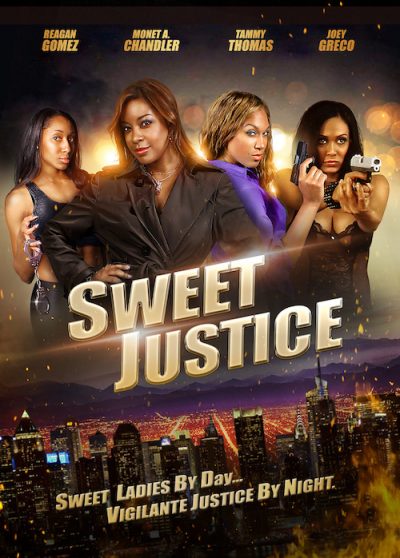 Four women run a charitable agency in Texas, helping single mothers track down and obtain child support payments from deadbeat dads. However, they don’t limit themselves to the simple serving of legal papers. The women adopt a more… hands-on approach, shall we say, first luring their targets in with the promise of sex, then threatening them at gunpoint, to make sure they pay up. For obvious reasons, the cops soon take interest in this string of unusual armed robberies. Meanwhile, the city’s white mayor, is dealing with a domestic crisis of her own, thanks to her daughter having had a child by (gasp!) a black man.
Four women run a charitable agency in Texas, helping single mothers track down and obtain child support payments from deadbeat dads. However, they don’t limit themselves to the simple serving of legal papers. The women adopt a more… hands-on approach, shall we say, first luring their targets in with the promise of sex, then threatening them at gunpoint, to make sure they pay up. For obvious reasons, the cops soon take interest in this string of unusual armed robberies. Meanwhile, the city’s white mayor, is dealing with a domestic crisis of her own, thanks to her daughter having had a child by (gasp!) a black man.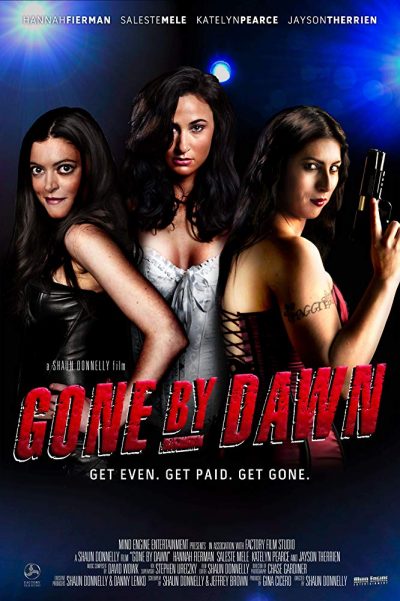 I decided I might as well combine these two into a single review. Having watched them back-to-back, even though made and set three years apart, they felt very much like the continuation of a single story about the same characters. The main one is Roxy (Mele), who is a dancer at a Wisconsin strip-club run by the sleazy Stag (Therrien), mostly as a money-laundering front for local organized crime. When he and his pal rape an employee, Alana (Pearce), Roxy along with the victim and another dancer, Crystal (Fierman), decide to take revenge by robbing Stag. That means getting into the safe in his office where the money is, and he’s not exactly going to give up the combination freely. Still, nothing that a piano-wire garrotte round the testicles can’t solve, surely? Except, as usual in this genre, the heist doesn’t go smoothly. Stag’s office quickly begins to resemble a mortuary, as unwelcome guests need to be handled.
I decided I might as well combine these two into a single review. Having watched them back-to-back, even though made and set three years apart, they felt very much like the continuation of a single story about the same characters. The main one is Roxy (Mele), who is a dancer at a Wisconsin strip-club run by the sleazy Stag (Therrien), mostly as a money-laundering front for local organized crime. When he and his pal rape an employee, Alana (Pearce), Roxy along with the victim and another dancer, Crystal (Fierman), decide to take revenge by robbing Stag. That means getting into the safe in his office where the money is, and he’s not exactly going to give up the combination freely. Still, nothing that a piano-wire garrotte round the testicles can’t solve, surely? Except, as usual in this genre, the heist doesn’t go smoothly. Stag’s office quickly begins to resemble a mortuary, as unwelcome guests need to be handled.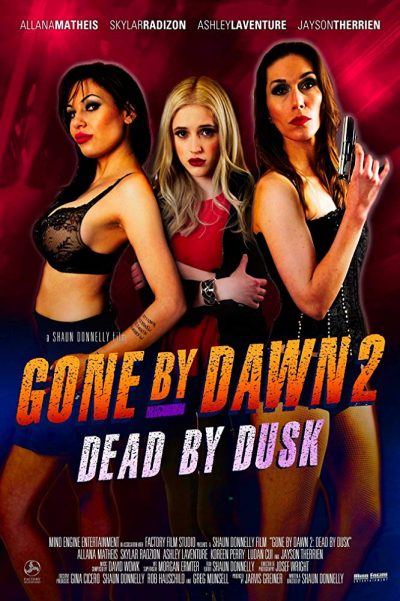 I didn’t think the sequel worked as well. While Roxy returns, she has been recast, being now played by Matheis – I’m not sure what happened to Mele. Still, I did laugh when one supporting character greets her with, “You look different!” Oddly, while the first film started with Roxy skipping town, the second sees her back, working at the same venue where she was involved in a multiple homicide. I know strippers are renowned for making poor decisions, but still… It turns out, having absconded with nine hundred grand of the mob’s money isn’t a good idea. They want it back, and to this end, have sent a trio of hired killers, named the Three Bears by Roxy. They’re prepared to do anything, up to and including both kidnapping and murder. But Roxy, along with Jesse (Radzion), a friend of Alana’s, and another dancer, Alura (Laventure), plots to turn the tables on the Three Bears, by robbing their boss.
I didn’t think the sequel worked as well. While Roxy returns, she has been recast, being now played by Matheis – I’m not sure what happened to Mele. Still, I did laugh when one supporting character greets her with, “You look different!” Oddly, while the first film started with Roxy skipping town, the second sees her back, working at the same venue where she was involved in a multiple homicide. I know strippers are renowned for making poor decisions, but still… It turns out, having absconded with nine hundred grand of the mob’s money isn’t a good idea. They want it back, and to this end, have sent a trio of hired killers, named the Three Bears by Roxy. They’re prepared to do anything, up to and including both kidnapping and murder. But Roxy, along with Jesse (Radzion), a friend of Alana’s, and another dancer, Alura (Laventure), plots to turn the tables on the Three Bears, by robbing their boss.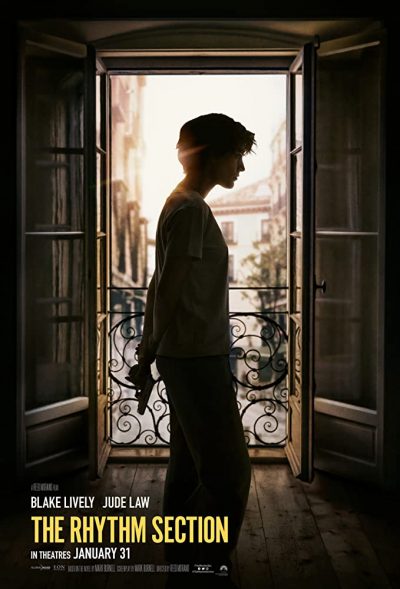 The action-heroine genre has seen its share of high-profile flops in the past. But this long-delayed entry, originally due out in February 2019, is among the worst, setting a record for the lowest ever opening at the North American box-office for a wide release. It took in only $2.8 million from 3,049 theaters when it opened in January, and ended with a worldwide gross below $6 million, against a budget of $50 million. While smaller in scale, that’s a
The action-heroine genre has seen its share of high-profile flops in the past. But this long-delayed entry, originally due out in February 2019, is among the worst, setting a record for the lowest ever opening at the North American box-office for a wide release. It took in only $2.8 million from 3,049 theaters when it opened in January, and ended with a worldwide gross below $6 million, against a budget of $50 million. While smaller in scale, that’s a